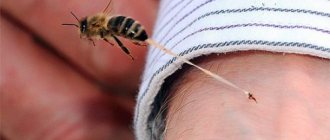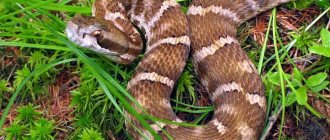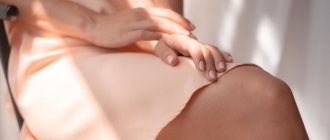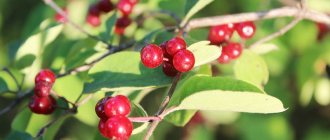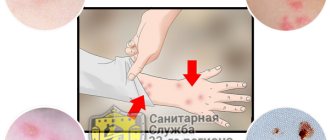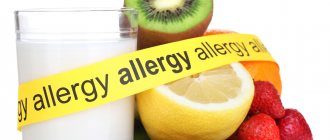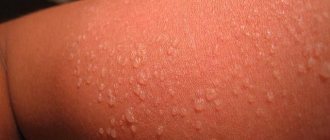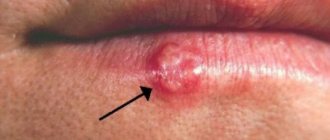The first troubles and even ailments that we encounter in nature with the onset of warm weather are insect bites. We recently dealt with tick bites, and there are bites from wasps, bees, and mosquitoes ahead. How can they be dangerous and what should you do if you or a child are bitten and develop a severe reaction to the bite?
Symptoms of a mosquito bite
Recognizing a mosquito bite is quite simple. After all, its first signs appear almost immediately. Symptoms of a mosquito bite are primarily itching, burning, redness and inflammation of the affected area of the skin. A small red or pink blister appears in the place where the mosquito bit. This reaction is typical for the human body and is completely normal. Usually such a blister can disappear without a trace. But if, after a long period of time, many red blisters and spots appear on the skin, you should immediately seek medical help. After all, this could be the beginning of an infectious disease.
Disinfection
Antiseptics are widely used to disinfect the skin. This is the first step towards getting rid of mosquito bites quickly.
Modern antiseptics are produced on an alcohol or water basis. Alcohol-containing products act quickly and reliably, but can dry out the skin and have a characteristic pungent odor. Water-based antiseptics are more gentle and can be recommended for children.
Immediately after the bite, a red, itchy area appears on the body. To quickly relieve discomfort you need:
- rinse the fireplace with cold water;
- dry it with blotting movements, without rubbing or pressing on the skin;
- treat the affected area with an alcohol- or water-based antiseptic (furacilin, chlorhexedine, dekasan);
- take a pain reliever or antihistamine.
Go to website
Hydrogen peroxide, alcohol tincture of medicinal herbs (valerian, motherwort), tea tree oil, and table vinegar solution can be used as disinfectants. Antiseptics stop the inflammatory process and prevent infection. This significantly reduces healing time and allows you to get rid of bite marks quickly.
Why does a mosquito bite start to itch?
People almost always feel itching after a mosquito bite.
If you don't forcefully rub the damaged area or comb it, it will stop itching on its own. Interestingly, only female mosquitoes can bite humans. But males eat plant juice and nectar. However, females do not damage the skin until it bleeds in order to get enough of it. They need it to speed up fertilization.
A mosquito pierces the skin with a small thin proboscis. After this, a microscopic wound forms on the body, which is immediately clogged with blood. To prevent blood from clotting quickly, the insect injects anticoagulant proteins into the wound. They slow down the coagulation process and allow mosquitoes to suck out more blood.
Of course, our body responds immediately to the action of such proteins. After all, they are alien to us. It sends neutrophils, leukocytes and other immunocompetent cells to the bitten area. They neutralize the mosquito “poison”. As a result, swelling, inflammation appears, and the wound begins to itch very much.
Where and how many days or years do mosquitoes live?
Such questions are usually asked by children to their parents. Female mosquitoes live on average 2-3 months unless they die from chemicals, starve, or are caught by humans. Males live much shorter lives, only about 2 weeks. There is a misconception that they can live for several years.
Where do mosquitoes live? Mosquitoes can live anywhere, the main condition is a fairly warm temperature from +10C +15C and high humidity. Mosquitoes prefer to live and breed near ponds, swamps and rivers; they adore forests.
Where else can you find them? They love to live in dry grass, treetops, on farms near manure, in cellars and basements, outbuildings and country houses.
Therefore, before choosing a place where you will build a summer house, think about the presence of mosquitoes. Otherwise, your holiday at the countryside may be spoiled, you will be bitten, etc.
You should not choose areas located in the forest itself or next to it, or near abandoned reservoirs and ponds. This is where mosquitoes live and breed, and they won’t mind feasting on your blood.
Why are mosquito bites harmful?
There are people who react strongly to even the mildest mosquito bites.
This may well cause them to experience severe swelling, hives, swelling, and even nausea and dizziness. This condition in medicine is called “culicidosis”, simply called an allergy. If you have it, folk and pharmacy remedies will not help. It is necessary to consult a qualified doctor. For most people, a mosquito bite is harmless.
However, it is worth saying that insects such as lobsters can be potential carriers of infectious diseases. Therefore, if you notice atypical and strange symptoms after a mosquito bite, visit a doctor immediately.
Infections after a bite
A huge number of people on the planet perceive a mosquito bite easily and without consequences. But this only happens if the mosquito itself was not infected. If after a mosquito bite a person develops strange symptoms, then the mosquito was a carrier of some kind of disease, for example:
- malaria,
- Zika virus,
- yellow fever
In these cases, only timely medical care can help the infected person.
Children are especially sensitive to the bites of blood-sucking insects. They have thin skin and symptoms of bites can appear for 3 months. It is expressed in suppuration, redness and swelling. To prevent this, lubricate the damaged area with brilliant green.
A bit of Wikipedia
According to Wikipedia, blood-sucking mosquitoes (lat. Culicidae) are a family of dipterous insects belonging to the long-whiskered group. In the modern world, the number of mosquito species totals more than 3.5 thousand . These insects are found on every continent (and in every country) except Antarctica, which makes sense given local temperature conditions.
Interesting fact! Humans and animals in particular are bitten exclusively by females. Males do not have developed jaws and do not have specific organs to bite a person. Human blood, rich in protein and glucose, is needed by female mosquitoes to bear offspring .
Russia and surrounding countries are home to more than 100 species of blood-sucking mosquitoes, including several malaria species (Orthopodomyia, Uranotaenia, Coquillettidia and Anopheles).
Malaria mosquito (Anopheles)
Humans are primarily responsible for the spread of various types of mosquitoes around the globe. The eggs and larvae of future adults (adult insects) survive travel in cars, trucks, trains, ships and even airplanes. One can only guess how many larvae of malaria mosquitoes were brought by tourists from southern countries during one tourist season.
Allergic manifestations
Two to three days after an insect bite, it is recommended to check the damaged areas for an allergic reaction of the body.
It is characterized by thickening of the skin and discharge from the wound. If the allergic reaction is moderate, these symptoms may include dizziness, vomiting, diarrhea, pressure and pain in the chest and heart.
In severe cases, this may include suffocation, anaphylactic shock, confusion, or loss of consciousness due to obstruction of the airway.
For allergies, you can take an antihistamine: “Suprastin”, “Tavegil”, “Zirtek”, “Diazolin” and others.
If the allergy develops very quickly, it is better to administer these medications intramuscularly. But in order to neutralize the dangerous saliva of a mosquito, it may be necessary to administer Prednisolone.
The appearance of blisters
After a mosquito bite, a blister often appears on the skin.
It can have varying degrees of severity and swelling. It usually occurs in newborns, but can also occur in adults. This is how the immune system reacts to the puncture of the skin membrane and the penetration of mosquito saliva into the body. The blister itself can reach 1 cm. To remove such an unpleasant symptom as a blister, it is enough to treat it with an antiseptic and apply something cold to it.
Please note that watery globules after an insect bite should not frighten parents of infants. They go away immediately after proper medical care.
Why do mosquitoes bite some people more and leave others alone?
According to scientists' research, mosquitoes choose a victim based on information collected by numerous receptors located on the proboscis. In short, female mosquitoes “smell” a person: his smell, sense his blood type and even the acids, vitamins and other substances that make up it.
According to scientists, mosquitoes are able to smell chemicals such as:
- uric acid and its excess in the body;
- some types of hormones;
- cholesterol;
- carbon dioxide;
- hormones released with human sweat;
- steroids.
Mosquitoes are also able to distinguish blood type and respond to movement or body temperature.
Why do mosquitoes bite some people more often than others?
Many have encountered a situation where, in a large company, mosquitoes bite more of some people, and practically do not touch individuals. And jokes like: “He/she is more delicious” have a certain meaning. The fact is that, given an equal choice at first glance, a female mosquito is more likely to bite a person who has the substances listed in the list above in their blood or on the surface of their skin.
Interesting! The joke that someone is really “tastier” to mosquitoes is not without meaning . But if a person is alone and does not smell of pheromones, the female mosquito will bite him without a twinge of conscience, with all that it entails.
Mosquito bites - how to treat
An itchy blister and redness are far from the most serious consequences of a mosquito bite. For some, it may result in complete hospitalization. For example, if culicidosis and insect allergies have developed. They can be prevented using antihistamines:
- "Fenistil"
in the form of a roller pencil or gel. This drug is suitable for newborns from 1 month. The drug is applied to the bite in a thin layer 2-3 times a day. It is quickly absorbed and begins to act almost immediately. - “Soventol”
in the form of an ointment. It acts instantly, blocking receptors that provoke allergies. If once is not enough, you need to apply the ointment again. Soventol should not be used by people intolerant to propylene glycol. - “Advantan”
in the form of a cream, ointment or emulsion. Relieves inflammation and allergies. Can be used in children from 4 months. - “Elidel”
cream. It has a pronounced anti-inflammatory effect. Can be used for allergies such as dermatitis and eczema. Contraindicated for children under 3 months. - “Bepanten”
in the form of ointment, cream. Can be used in children from +0 years. - “Menovazin”
solution. - “Psilo-balm”
in the form of a gel. Suppresses the inflammatory response. Cannot be used by a child under 2 years of age. In terms of efficiency, it ranks 2nd after Fenistil. - “Gistan”, “Hydrocortisone”
in the form of hormonal ointments.
You can safely treat mosquito bites over a long period of time using the following herbal remedies:
- “Rescuer”
balm, which includes turpentine, various oils, calendula and beeswax). - “Nezulin”
which contains chamomile, celandine, licorice, oils and D-panthenol. - “Boro-Plus”
ointment, which includes ginger, aloe, licorice and turmeric.
To achieve a pronounced effect from gels, creams and ointments, you need to combine them with anti-allergy tablets.
Before applying the products to the skin, it is recommended to rinse the bite areas with running water and apply ice to them. But in order to remove bite marks, you can use drugs for chickenpox, which heal the skin well. For example, “PoxClean” hydrogel, a solution of fucorcin and rivanol, brilliant green.
If an insect has bitten an area of the eye and its mucous membranes have been damaged, it is recommended to drip “Albucid” or “Sodium Sulfacyl” drops into both eyes. From above, the affected area can be lubricated with tetracycline ointment intended for ophthalmic treatment.
Treatment
Symptomatic treatment
- Relief of allergy symptoms with 2nd generation antihistamines (in age-appropriate dosage): cetirizine, loratadine, desloratadine. The duration of the appointment is prescribed by the doctor.
- Normalization of the general condition with glucocorticosteroids: pulmicort, nasonex.
- Application of antipruritic creams.
Preventative treatment
- If it is not possible to avoid mosquito bites, your doctor may prescribe antihistamines for as long as the insects are active.
- Use repellents.
Immunotherapy ASIT
Fortunately, mosquito bite allergies can be treated with immunotherapy. However, like allergies to bee and wasp stings.
Timely ASIT helps reduce the body's sensitivity to mosquito allergens and improves the quality of life of an allergy sufferer, reducing the level of fear of insects
ASIT is carried out in autumn and winter for 3 – 5 years. For therapy, an extract of mosquito bodies is used.
Unfortunately, mosquito allergies are not officially treated in Russia.
But specialists from the State Scientific Center of the Russian Federation - Institute of Immunology of the FMBA - have created a medicinal form of a water-salt extract of the mosquito allergen Aedes Aegypti. Now scientists are waiting for the official registration of the drug.
Abroad, mosquito allergies are well treated with medications, both in tablets and injections.
When is ASIT prescribed?
- if a true allergy to mosquitoes is confirmed;
- increasing violent reactions to bites (severe systemic reactions);
- respiratory symptoms worsening year after year;
- Allergy sufferers have a strong fear of insects.
While domestic medicine cannot offer treatment methods, allergy sufferers are left with only prevention.
Products with zinc among the main components
Preparations based on zinc oxide relieve itching well.
This element destroys the structure of proteins foreign to the human body. In addition, zinc oxide stimulates the maturation of lymphocytes and increases tissue resistance to foreign substances. Preparations that contain zinc oxide are “Tsindol”, “Lassara Paste”, “Zinc Ointment” and “Calamine” in the form of lotion. The affected areas should be lubricated with these products 3-4 times a day.
Bite pressure method
If there are no pharmacy or folk remedies nearby, the method of manual pressure on the bite will be very useful.
Just apply two pressures with your fingernail on the site of the mosquito bite, lengthwise and crosswise. This way you should get a “cross”. You will immediately feel that the itching has gone away. This occurs as a result of the fact that when pressure is applied to the wound, the mosquito saliva containing the dangerous protein dissipates and the affected area stops itching. If you have a ballpoint pen handy, you can apply pressure to the affected area.
Folk remedies
Regular cold water or ice will help reduce redness and relieve itching. Cold milk or kefir can also relieve swelling.
Natural oils
Various types of essential oils can easily cope with the itching and beauty of the affected area. They not only prevent swelling, burning and itching, but also dry the wound, which promotes its rapid healing. The following natural oils are especially effective:
bergamot,- lavender,
- basilica,
- tea tree,
- coconut,
- carnations.
Before using essential oils, carefully read their composition. It is better not to use essential oil with a high acid content or dilute it with water.
Warm
Surprisingly, not only cold, but also heat helps against insect bites. If you have a lot of bites, a warm shower will help relieve the itching. Do not scrub the affected areas with a washcloth or a hard-lined towel. A slightly hot towel or cloth can be applied to single bites.
Acetic acid and apple cider vinegar
Using vinegar to relieve itching is a very effective method.
Malic acetic acid is best suited for these purposes. Soak the sponge in vinegar and apply to the itchy area. It is recommended to stick the cotton wool with a band-aid so that the vinegar comes into contact with the bite site for as long as possible. You can also use regular table vinegar to treat a mosquito bite. Vinegar paste is also made from it, to which corn flour is added. The paste is spread on the wound and kept there for about 20 minutes. Afterwards, the paste is washed off with running water and the itching goes away.
Sea and table salt
Our great-grandmothers knew this method.
Lubricate the bite area with sea or table salt. In a minute you will feel relief, and then the itching will completely disappear. If there are a lot of bites, it is better to take a bath with sea salt.
Potassium permangantsovka
Every home medicine cabinet definitely contains potassium permanganate. The problem area should be lubricated with potassium permanganate diluted in water and the itching will go away. Also for these purposes they use brilliant green and iodine, which are also always available in the house.
Basil oil
Basil oil is a universal remedy against mosquito bites. It not only washes away swelling and itching, but also repels bloodsuckers well.
Herbs and plants
If you need to prevent a mosquito bite from itching, you can use an extract of meadow, forest, indoor and garden plants and herbs. For example, plant leaves are applied to the problem area, and the juice is moistened into the wound or a decoction or tincture is prepared from it. The following plants cope especially well with mosquito bites:
calendula,- aloe,
- mint and lemon balm,
- onion,
- lemon,
- parsley,
- garlic,
- dandelion,
- plantain and celandine.
Soda
Mix two teaspoons of baking soda in a glass (150 - 200 ml) of warm water. Soak a cotton swab in the solution and apply lotions to the affected areas. Baking soda is great for treating itching, swelling and redness.
Honey
When a mosquito bites, honey can act as an antiseptic and also an anti-inflammatory agent. It relieves itching and pain, relieves swelling. Just apply a small drop of honey to the wound until it dries. You can use honey as many times as necessary. The main thing is that you are not allergic to this product.
Cereals
Grind the oatmeal in a blender or coffee grinder and cook it until a thick paste forms. Apply the paste to the affected area and rinse off with plain water after 15 minutes.
How to eliminate the consequences of a mosquito bite in a child
Very often, insect bites cause a severe allergic reaction in children, especially newborns. Therefore, this must be taken as seriously as possible. You should pay attention to the following symptoms:
- heat,
- severe swelling,
- large area of redness,
- nausea and vomiting,
- pain in muscles and head.
Sometimes after a bite, children may experience low blood pressure and a pre-fainting state. If a child is prone to allergies, it is recommended to immediately give him antihistamines. If symptoms do not go away for a long time, it is better to immediately consult a doctor.
Types of mosquito repellents
If you want to purchase special repellents that protect against mosquitoes, you should pay attention to the following types of products:
-
Bracelets
- used mainly for children. They are made of elastic textiles, and inside they contain anti-mosquito, hypoallergenic substances, non-toxic even for a small child. - Fumigators
are devices into which plates containing active substances are inserted. When the fumigator is heated, the substances begin to spread in the room and thereby kill mosquitoes. If there are children under one year old in the house, the use of fumigators is prohibited. But if the child is already a year old, you can turn on the device for 2 hours. If the baby is already 3, the fumigator can be turned on all night. - Spirals
- suitable for outdoor use. The spiral is fixed on a stable surface and set on fire. Smoke fumigates the air around you and mosquitoes are afraid to fly close to you. - Ultrasonic repellers
are modern devices that can be portable or stationary. You can take portable ones with you to the forest, to the river, to pick mushrooms, etc. But stationary ones are used inside houses and apartments. These devices produce sounds that humans cannot hear. However, insects hear them and keep a safe distance from them.
It's better not to be bitten: simple rules
The best thing about dealing with mosquitoes is to avoid them. They are most active from evening until dawn. Most mosquito swarms are found near ponds, swamps, in shady parks and forests. If an evening walk in these places cannot be avoided, clothing should cover the skin as much as possible. You should definitely use repellent. There is a wide choice, but the main thing you should pay attention to when purchasing is whether the product can be used on the body or only on clothes. Both options are acceptable and effective, but it is important not to apply the one for clothing to the skin - this can cause irritation.
It is worth using fumigators indoors when the windows are open, especially if you have noticed that mosquitoes have become frequent guests in your bedroom due to the open windows.
